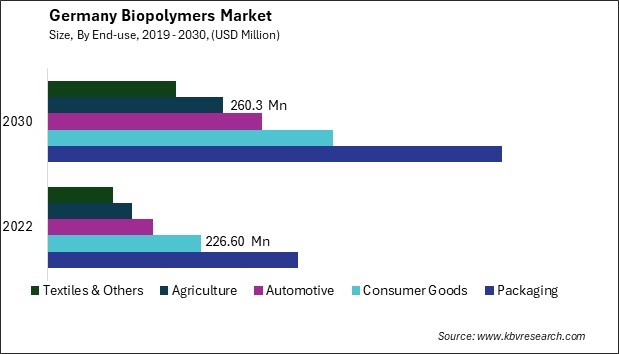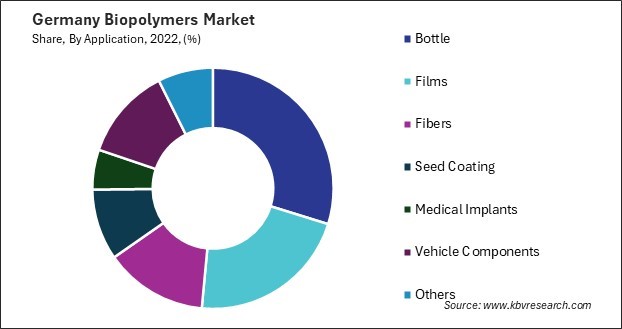Germany Biopolymers Market Size, Share & Trends Analysis Report By End-Germanye), By Application, By Product (Biodegradable Polyesters, Bio-PE, Bio-PET, Polylactic Acid (PLA), Polyhydroxyalkanoate (PHA), and Others), and Forecast, 2023 - 2030
Published Date : 15-May-2024 |
Pages: 67 |
Formats: PDF |
COVID-19 Impact on the Germany Biopolymers Market
The Germany Biopolymers Market size is expected to reach $1.9 Billion by 2030, rising at a market growth of 8.5% CAGR during the forecast period. In the year 2022, the market attained a volume of 318.1 Kilo Tonnes, experiencing a growth of 7.8 % (2019-2022).
The German biopolymers market is experiencing significant growth and innovation, driven by the increasing necessity of biopolymers across various industries. Biopolymers are utilized more frequently in the packaging industry to mitigate environmental issues linked to traditional plastics. For example, companies like BASF are developing biopolymer-based packaging solutions such as ecovio®, a compostable bioplastic that can be used for a variety of packaging applications. This innovation aligns with the industry's need for sustainable packaging materials that can reduce reliance on fossil fuels and minimize environmental impact.

The automotive industry is also turning to biopolymers to enhance sustainability in vehicle manufacturing. Covestro, a major biopolymers market player, has developed bio-based raw materials for automotive interiors, such as car seat cushions made from renewable raw materials. In the agricultural sector, biopolymers are utilized in products like mulch films, which help improve soil health and reduce environmental impact compared to conventional plastic films. BASF's ecovio® FS film is also an example of a biopolymer-based mulch film that offers biodegradability and can be used in sustainable agricultural practices. This demonstrates how biopolymers are contributing to more sustainable farming methods that align with environmental goals.
Furthermore, the healthcare and medical industries are increasingly adopting biopolymers for applications such as medical packaging and disposable medical devices. For instance, Evonik offers a biodegradable polymer called RESOMER® that is used in medical implants and drug delivery systems. Biopolymer-based solutions that are controlled in their degradation and biocompatible satisfy the healthcare sector's rigorous standards while simultaneously tackling sustainability issues. Consequently, with the increasing demand for sustainable materials, the German biopolymers market is anticipated to assume a pivotal role in advancing sustainability and innovation in the coming years.
Market Trends
Increasing demand for seed coating products
Germany is experiencing a notable increase in the demand for seed coating products, driven by several factors shaping the country's agricultural sector. The increasing focus on sustainable agricultural practices and the imperative to enhance crop yields while mitigating environmental harm constitute a notable catalyst. Seed coating products offer a targeted approach to crop protection, allowing for the precise application of pesticides and fertilizers directly to the seed, which can reduce overall chemical usage and minimize environmental contamination.
Another factor contributing to the demand for seed coating products is the focus on improving seed quality and plant health. Coating seeds with specialized materials can enhance their germination rates, protect them from soil-borne diseases, and improve their ability to withstand environmental stresses such as drought or heat, all of which are important considerations for farmers looking to maximize their yields.
Furthermore, the increasing adoption of genetically modified (GM) seeds in Germany is driving the need for specialized seed coating products tailored to these crops. GM seeds often require specific treatments to ensure proper expression of their genetic traits, and seed coating offers a precise and efficient way to deliver these treatments. The increasing adoption of GM seeds in Germany requires specialized seed coating products tailored to these crops. Biopolymers can be customized to meet the specific requirements of GM seeds, providing a compatible and efficient delivery system for treatments that ensure the proper expression of genetic traits. As the use of GM seeds continues to expand, so does the demand for biopolymers that can effectively support these advanced agricultural technologies.
Rapidly expanding automotive industry
Germany's automobile industry is renowned globally for its innovation, quality, and technological prowess, making it a cornerstone of the country's economy. Vehicle production, automotive component and system manufacturing, research and development, and a vast array of other activities are all included in this sector. With a strong focus on innovation and sustainability, the industry has driven Germany's economic growth and global competitiveness.
In 2021, German automakers produced more than 15.6 million vehicles, as reported by Germany Trade & Invest. German automobile suppliers comprise fifteen of the top seventy-five globally. With over 3.1 million passenger cars and 351,000 commercial vehicles produced in German plants in 2021, Germany is the European leader in automobile manufacturing. With an estimated 34.1 percent of total German industry R&D expenditures of 71 billion euros in 2020, the automotive sector is the most innovative industry in Germany.
The sheer volume of vehicles produced by German manufacturers, as highlighted by the production figures for 2021, underscores the substantial need for materials used in automotive components and systems. Biopolymers, known for their versatility and eco-friendly properties, can find applications in various vehicle components, including interior parts, exterior panels, and structural elements, contributing to the industry's sustainability goals. Thus, the size of Germany's automotive industry, innovation-driven culture, sustainability initiatives, and global influence can significantly impact the demand for biopolymers.

Competition Analysis
In the German biopolymers market, several companies are making significant contributions to developing, producing, and distributing biopolymer products, leveraging innovation and sustainability as key drivers. These companies play pivotal roles in advancing biopolymer technologies across diverse industries and are recognized for their commitment to eco-friendly solutions.
As one of the world's largest chemical companies, BASF is a major player in the biopolymers market. The company is known for its extensive portfolio of biodegradable plastics and polymers derived from renewable resources. BASF's biopolymer products cater to various applications, including packaging, textiles, and automotive components, contributing to the company's leadership in sustainable materials.
Covestro is a leading supplier of high-performance polymers and materials, including biopolymer solutions. The company offers a range of bio-based raw materials and biodegradable polymers used in the automotive, construction, and electronics industries. By emphasizing sustainability and innovation, Covestro has established itself as a significant force in the development of biopolymers in Germany.
Evonik is a specialty chemicals company known for its innovative products and solutions, including biodegradable polymers. The company's biopolymer offerings include bio-based polyamides and polyesters used in packaging, textiles, and medical devices. Evonik's commitment to sustainability and expertise in specialty chemicals make it a prominent player in the German biopolymers market.
FKuR Kunststoff GmbH is a specialist in biodegradable and compostable plastics, focusing on sustainable solutions for various industries. The company offers a wide range of biopolymer products, including bio-based polyethylene and biodegradable polyester compounds used in packaging, agriculture, and consumer goods. FKuR's dedication to environmentally friendly materials has established it as a key supplier in the German biopolymers market.
These companies and other key players in the German biopolymers market are instrumental in driving the development and adoption of biopolymer technologies across industries. Their focus on sustainability, innovation, and the production of high-quality biopolymer products positions Germany as a hub for biopolymer research, development, and commercialization.
List of Key Companies Profiled
- BASF SE
- Archer Daniels Midland Company
- DuPont de Nemours, Inc.
- bio-tec Biologische Naturverpackungen GmbH & Co. KG
- Novamont S.p.A. (Versalis S.p.A.)
- BioLogiQ Inc.
- BioPolymer GmbH & Co KG
- Solanyl Biopolymers Inc.
- BioPolymer Industries, Inc.
Germany Biopolymers Market Report Segmentation
By End-use
- Packaging
- Consumer Goods
- Automotive
- Agriculture
- Textiles & Others
By Application
- Bottle
- Films
- Fibers
- Seed Coating
- Medical Implants
- Vehicle Components
- Others
By Product
- Biodegradable Polyesters
- Bio-PE
- Bio-PET
- Polylactic Acid (PLA)
- Polyhydroxyalkanoate (PHA)
- Others
1.1 Market Definition
1.2 Objectives
1.3 Market Scope
1.4 Segmentation
1.4.1 Germany Biopolymers Market, by End-use
1.4.2 Germany Biopolymers Market, by Application
1.4.3 Germany Biopolymers Market, by Product
1.5 Methodology for the research
Chapter 2. Market Overview
2.1 Introduction
2.1.1 Overview
2.1.1.1 Market Composition and Scenario
2.2 Key Factors Impacting the Market
2.2.1 Market Drivers
2.2.2 Market Opportunities
2.2.3 Market Restraints
2.2.4 Market Challenges
2.2.5 Market Trends
2.3 Porter’s Five Forces Analysis
Chapter 3. Strategies Deployed in Biopolymers Market
Chapter 4. Germany Biopolymers Market
4.1 Germany Biopolymers Market by End-use
4.2 Germany Biopolymers Market by Application
4.3 Germany Biopolymers Market by Product
Chapter 5. Company Profiles – Global Leaders
5.1 BASF SE
5.1.1 Company Overview
5.1.2 Financial Analysis
5.1.3 Segmental and Regional Analysis
5.1.4 Research & Development Expense
5.1.5 Recent strategies and developments:
5.1.5.1 Product Launches and Product Expansions:
5.1.5.2 Geographical Expansions:
5.1.6 SWOT Analysis
5.2 Archer Daniels Midland Company
5.2.1 Company Overview
5.2.2 Financial Analysis
5.2.3 Segmental and Regional Analysis
5.2.4 Research & Development Expense
5.2.5 Recent strategies and developments:
5.2.5.1 Partnerships, Collaborations, and Agreements:
5.3 DuPont de Nemours, Inc.
5.3.1 Company Overview
5.3.2 Financial Analysis
5.3.3 Segmental and Regional Analysis
5.3.4 Research & Development Expense
5.3.5 SWOT Analysis
5.4 bio-tec Biologische Naturverpackungen GmbH & Co. KG
5.4.1 Company Overview
5.5 Novamont S.p.A. (Versalis S.p.A.)
5.5.1 Company Overview
5.5.2 Financial Analysis
5.5.3 Segmental and Regional Analysis
5.5.4 Research & Development Expenses
5.5.5 Recent strategies and developments:
5.5.5.1 Partnerships, Collaborations, and Agreements:
5.5.5.2 Geographical Expansions:
5.5.6 SWOT Analysis
5.6 BioLogiQ Inc.
5.6.1 Company Overview
5.6.2 Recent strategies and developments:
5.6.2.1 Partnerships, Collaborations, and Agreements:
5.6.2.2 Product Launches and Product Expansions:
5.6.3 SWOT Analysis
5.7 BioPolymer GmbH & Co KG
5.7.1 Company Overview
5.8 BioPolymer Industries, Inc.
5.8.1 Company Overview
TABLE 2 Germany Biopolymers Market, 2023 - 2030, USD Million
TABLE 3 Germany Biopolymers Market, 2019 - 2022, Kilo Tonnes
TABLE 4 Germany Biopolymers Market, 2023 - 2030, Kilo Tonnes
TABLE 5 Germany Biopolymers Market by End-use, 2019 - 2022, USD Million
TABLE 6 Germany Biopolymers Market by End-use, 2023 - 2030, USD Million
TABLE 7 Germany Biopolymers Market by End-use, 2019 - 2022, Kilo Tonnes
TABLE 8 Germany Biopolymers Market by End-use, 2023 - 2030, Kilo Tonnes
TABLE 9 Germany Biopolymers Market by Application, 2019 - 2022, USD Million
TABLE 10 Germany Biopolymers Market by Application, 2023 - 2030, USD Million
TABLE 11 Germany Biopolymers Market by Application, 2019 - 2022, Kilo Tonnes
TABLE 12 Germany Biopolymers Market by Application, 2023 - 2030, Kilo Tonnes
TABLE 13 Germany Biopolymers Market by Product, 2019 - 2022, USD Million
TABLE 14 Germany Biopolymers Market by Product, 2023 - 2030, USD Million
TABLE 15 Germany Biopolymers Market by Product, 2019 - 2022, Kilo Tonnes
TABLE 16 Germany Biopolymers Market by Product, 2023 - 2030, Kilo Tonnes
TABLE 17 Key Information – BASF SE
TABLE 18 Key Information – Archer Daniels Midland Company
TABLE 19 Key Information –DuPont de Nemours, Inc.
TABLE 20 Key Information – bio-tec Biologische Naturverpackungen GmbH & Co. KG
TABLE 21 Key Information – Novamont S.p.A.
TABLE 22 Key Information – BioLogiQ Inc.
TABLE 23 Key Information – BioPolymer GmbH & Co KG
TABLE 24 Key Information – BioPolymer Industries, Inc.
List of Figures
FIG 1 Methodology for the research
FIG 2 Germany Biopolymers Market, 2019 - 2030, USD Million
FIG 3 Key Factors Impacting Biopolymers Market
FIG 4 Porter’s Five Forces Analysis - Biopolymers Market
FIG 5 Germany Biopolymers Market share by End-use, 2022
FIG 6 Germany Biopolymers Market share by End-use, 2030
FIG 7 Germany Biopolymers Market by End-use, 2019 - 2030, USD Million
FIG 8 Germany Biopolymers Market share by Application, 2022
FIG 9 Germany Biopolymers Market share by Application, 2030
FIG 10 Germany Biopolymers Market by Application, 2019 - 2030, USD Million
FIG 11 Germany Biopolymers Market share by Product, 2022
FIG 12 Germany Biopolymers Market share by Product, 2030
FIG 13 Germany Biopolymers Market by Product, 2019 - 2030, USD Million
FIG 14 SWOT Analysis: BASF SE
FIG 15 SWOT Analysis: Archer Daniels Midland Company
FIG 16 SWOT Analysis: DuPont de Nemours, Inc.
FIG 17 SWOT Analysis: Novamont S.p.A.
FIG 18 SWOT Analysis: BioLogiQ Inc.